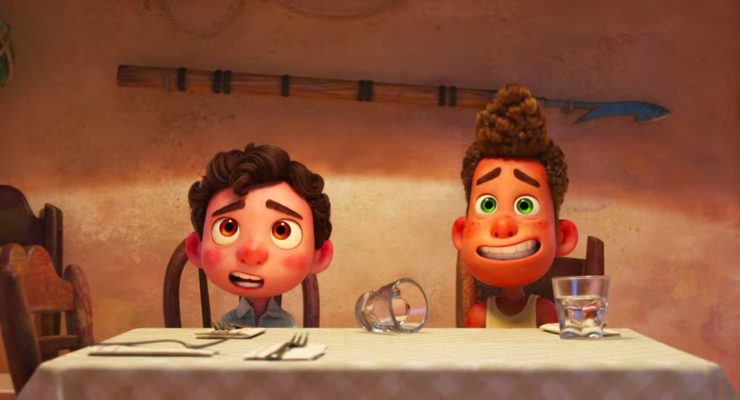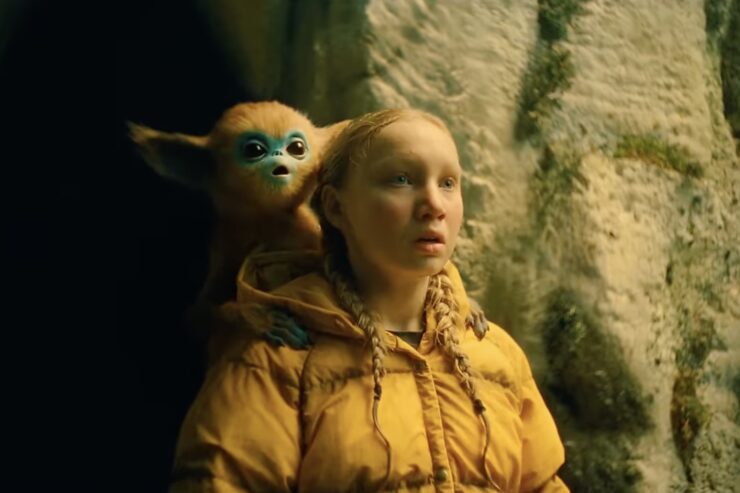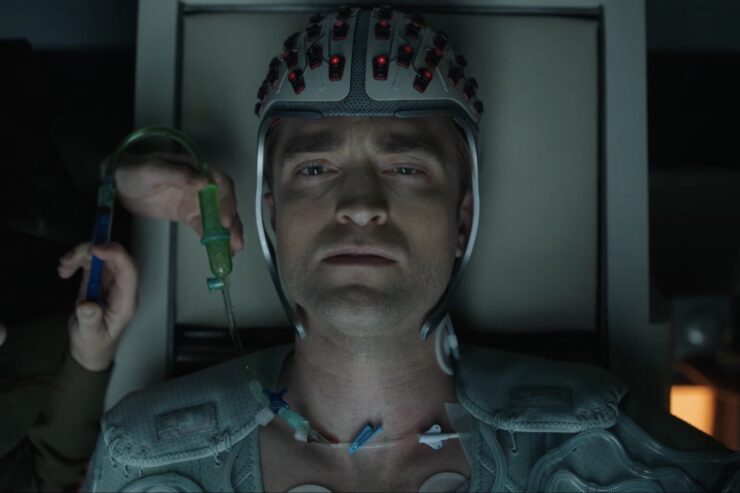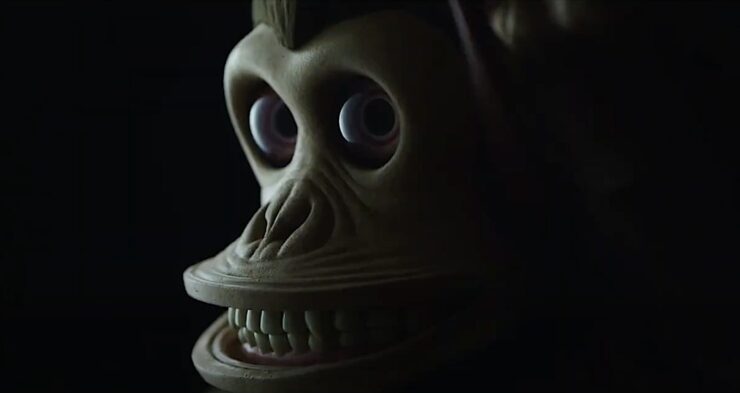Made during the 2020 quarantine, Luca is Pixar’s next attempt to make adults and children alike cry with tender tales of family, friendship, and love. The story of a young sea monster named Luca (Jacob Tremblay) and his unlikely friendship with fellow sea monster Alberto (Jack Dylan Grazer), Luca had the opportunity to do beautiful and unexpected things. But the Pixar method is wearing thin these days, and there’s not enough uniqueness in the film to make it stand out among their offerings.
Set in the Italian Riviera, Luca details the trials of its eponymous hero as he struggles with that age-old sea-person conundrum—interest in life on the surface despite being forbidden from it. Upon meeting Alberto, a boy roughly his own age, Luca learns that their people transform into humans on land (provided they don’t get wet), and takes to exploring with trepidation and wonder. The duo’s desire to explore hinges on their ability to get their hands on a Vespa, which Alberto believes can take them anywhere in the world.
Upon entering the seaside village of Portorosso, the boys learn of a triathlon-style race for kids that takes place there every year, and is always won by town bully Ercole Visconti (Saverio Raimondo). Ercole saved up his years worth of race prize money to get a very fancy Vespa, putting Alberto and Luca in mind of winning that race for themselves. They befriend a girl named Giulia (Emma Barman), who comes to town each summer to live with her stoic fisherman father Massimo (Marco Barricelli). Giulia is desperate to end Ercole’s “reign of injustice” and tries to win the race every year on her own, even though you can run it in teams of three, so you can see where this is going: The trio agree to train for the race together, with Giulia doing the swimming portion, Luca on the biking portion, and Alberto on the eating contest.
At its heart, Luca is meant to be a film about how friendships can change and enlighten you; director Enrico Casarosa stated in interviews that the two main characters were based upon himself and his own friend Alberto, a young man who was far more adventurous and worldly than he was in youth. Luca and Alberto’s relationship focuses on this dynamic, Luca’s sheltered upbringing giving way to Alberto’s mantra of “Silencio, Bruno”—the phrase he utters whenever his mind tries to warn him away from potentially frightening or dangerous situations. Through Alberto, Luca learns to be braver and thrives on the surface, even as his parents search desperately for him among the town’s children.
But despite its moving friendships and themes, Luca doesn’t earn its spot among the best Pixar films. It’s first problem comes from over-reliance on the Pixar “formula,” which always comes with a central task attached to its characters. In Luca, this is the Pontorossa Cup, the triathlon that the kids train for throughout the majority of the film. The race itself is the least interesting aspect of the entire story, and only exists to provide its narrative with stock plot points and characters that the animation house is accustomed to using; practice montages, stakes with a clear reward attached, a time limit placed upon those stakes. The entire film could have functioned just a well with the two boys working on Massimo’s fishing boat (which they do at various points in the narrative) to keep earning money for their Vespa-based dreams.
Ercole’s place in the story is as rote as it gets on the Pixar roster, interchangeable with their other slimy bullies like Monsters Inc.’s Randall and Ratatouille’s Chef Skinner. Focusing in on such a blunt and boring rivalry robs the film of its nuance and forces the narrative into the set number of beats that one expects in these exercises. For a studio that built their reputation on being more complex than your average animated family films, it’s disappointing to see Pixar settle into groves and trust their formula to do the work for them.
There’s another awkward aspect to Luca, and that hinges on queerness. A number of viewers (and this reviewer) have already noted that while the film does nothing definitive, there’s a very blatant allegory running through Luca and Alberto’s story, one that could easily be read as a tale of two boys who are having difficulty “coming out” in a world that has no intention of accepting sea monsters. They are close as a pair, beautifully so, and there are moments when the film renders something that could be the first inklings of love between the two. (Obviously, it’s not overt because they’re kids, but children do form crushes and strong bonds that can eventually translate into romance as they grow.) Casarosa has gently but firmly denied this reading—after all, it is based on his real life friendship.
This insistence gets even more awkward because of the allegorical nature of the story, and other reveals that occur later on in the narrative. We’re meant to infer that being a “sea monster” is just another way of being an outsider—or an underdog, as Giulia terms them—but the fact of the matter is that being underwater creatures of the deep are an actual threat to Luca and Alberto’s safety in the town of Pontorosso in a way that being an underdog blatantly is not. The village has legends about sea monsters and all their fishermen vow to hunt them down on sight, including Massimo, who is by all accounts a giant, soft-spoken teddy bear of a man. The boys are aware that if they are discovered, they will be murdered: That doesn’t sound like a metaphor for being a plain old outsider. And it makes the moments when Luca and Alberto only have each other stand out even more.
While it is important for young boys to have examples of loving friendships that they can emulate—and most people who protest queerness being levied onto any story usually cite that as their first point of anger—that’s a pointless issue to take when you look back at Pixar’s previous projects. Their entire history is full to the brim with close male friendships (Woody and Buzz, Mike and Sully, Remy and Linguini, Lightning and Mater, Carl and Russell), close male-female friendships (Marlin and Dory, Joe and 22, Woody and Jesse), and close male familial bonds (the Incredibles, Ian and Bartley, Miguel and Héctor). Notice that the same can’t be said for relationships between female characters, and that Pixar has a long-running history of hetero romance to the point where different genders had to be ascribed to two robots who look, respectively, like a Rubik’s cube with binoculars and a lost Apple earbud.
The point is, if the creators of Luca had paused for a moment to realize the accidental allegory emerging in their story, they could have done some restructuring and told a tale they’d truly never told before. And that tale is one that’s needed, and one that would have told a different version of acceptance than the one they’ve offered us before. It’s too bad because Luca, as it stands, is a very sweet story… that ultimately doesn’t have much to say.
And sure, you’ll probably still cry at the end. The Pixar format still works on that front, at least. But it’s hard not to walk away from Luca thinking about all the things it could’ve been, and ultimately chose not to be.
Emmet Asher-Perrin does really want to eat bowls and bowls full of pasta now, though. You can bug them on Twitter, and read more of their work here and elsewhere.















As a middle-aged father of two pre-teen girls I can appreciate (and, at least outwardly, so does my eldest) a film that focuses on friendship developed over shared attributes of imagination, creativity, exploration, and self-discovery without any overt romantic complications. Boys and Girls and Boys have such dwindling windows of opportunity to occupy this place between childhood and whatever it is that I have been living these past 30-odd years.
This is not to say that Emmet doesn’t make some excellent points, and Alberto’s response to Luca’s bonding with Giulia about education could easily have been spun into a romantic jealousy for his partner fish-out-of-water, but that instead I looked upon this coastal town-out-of-time through my own nostalgia haze and remembered my carefree summer days in the mid-’80s when an 11-year old kid could live this life. Friendships were simple, adventures were plentiful, and bullies were just jerks.
Perhaps this is just me seeking modern representation of my own experiences, or my own search for identity that wasn’t tied up in my relationship with my family or others but in understanding who I could be in a much larger diverse world. Which might also explain why I gravitated so hard to Massimo in this film.
I think perhaps it was best left to the viewer to make those romantic connections between the characters, but definitely, they could have leaned more into it. I do think for what it was, Luca was very well done. The graphics and animation were amazing – perhaps better than Raya from the Disney Studio. My biggest issue with the film is that it doesn’t trust its audience enough to let go of the Disney Channel slapstick. Every few seconds the kids are jumping and hiding and crashing and fretting that they might be seen by someone. It becomes tiring. Instead, trust your audience a bit more, let the film be just what it is – a love letter to a romantic, nostalgic summer on the Italian Riviera for two boys coming of age. Toss the stupid adult villain for a less stupid age appropriate kid ‘villain,’ and make the fact they are sea ‘monsters’ revealed at the very end… like just before The End. Luca’s parents show up to take him back into the sea, a tearful farewell between the boys, the girl looking on from afar, they are the only ones to see him change into a sea creature and disappear forever… then you pan down… Alberto’s foot is green with scales in the water of the surf… he goes back to his new home with the girl and her father… The End. Instead of the base age targeted right at 8 year olds, this could have been like Soul with a “generally everybody age range.” As Onward was very awkward with its “high volume,” Luca is also just shy of perfection by not letting the boys be whimsical instead of frantic.
I was a disappointed with how predictable and dull Luca was. How many freaking fantasy interludes do we need of Luca and Alberto on a Vespa?! It just made the story seem more thin and rote, like Moana on Xanax. I agree with Emmet that there was a really strong coming out allegory here that wasn’t leaned into. (See also: the 2 old ladies and their gelato!) Or perhaps there was more to explore with Luca overcoming anxiety (if there’s anything an Italian knows, it’s anxiety and depression issues.) The movie was beautiful to look at and I liked that it had clever little nods to classic Italian cinema and used the language, but it was just missing that depth of emotion I got from movies like Soul and Up. I
My fave scene was the Mom and Dad terrorizing human kids by throwing water at them. Legit the only belly laugh I had.
I was super hyped for this movie – mermaids are a huge fav of mine and I’m always looking for new content. And this is Pixar! Surely it’s going to be amazing! And like…yeah? It was really good and you could see the love that went into it. But then there’s this allegory for being gay throughout the whole thing, and honestly like it wasn’t confirmed or anything but it might as well have been? I went away not disappointed as this is Disney’s Pixar and god forbid we have actual representation, but hearing about how the directors are denying any queerness is getting under my skin. I can understand to a point – this is a friendship based on one of your own from childhood that never turned into anything queer – but why do you choose to put down the idea? You put this movie out, you added and changed it enough that we’re not talking about you and your childhood best friend – we’re talking about two fish people who believe they are the only things they need (and a Vespa), and want to be together forever. I mean…
From the synopsis given above, another interpretation could be that the two boys are hidden Jews in Nazi-occupied Italy – an unusually dark theme for a children’s film.
I mostly agree with this.
What really made me pause was trying to think of close relationships between main female characters. There’s Merida, with familial relationships (but no friends?)
There’s definitely good female characters in Pixar movies but usually either solitary or defined by their relationship with the male main character. Meanwhile there’s tons of male characters with friendships in Pixar movies that don’t involve women.
I’m not sure what’s being asked for here. Equating gayness with being a monster is not a good message. IMO, gayness for many is a natural state, and homo- and xenophobia are the aberrations.
I agree with much of the above: since they’re kids, I would have been content with even just some hint of emotional turmoil that the kids didn’t know how to properly name. Heck, there didn’t even need to be reciprocity: Alberto may have been the one struggling with feelings (Do I like-like Luca, or do I just like having someone in my life again?) while Luca remained splendidly oblivious the whole time. But to put up a metaphor like that without it actually being a metaphor for anything except a generic ‘being an outsider’ is a bit of a letdown. Especially, as it’s been pointed out, with the two gelato ladies looking a textbook example of closet lesbians.
Also, as an Italian, it was nice to see a realistic depiction of the Cinque Terre, while at the same time I was kinda disappointed by the lack of Italian VAs among the main characters and the excessive use of the ‘Italian hand gesture’. I wonder if this is something that the other heads at Pixar felt necessary to add? As a native of Genova, Casarosa would not have seen it that much in his daily life, being predominantly a gesture from southern Italy. To American audiences, it may scream “Italian”, but to me it’s just a tired stereotype.
I was also surprised that Portorosso was originally meant to be Luca’s surname and a reference to Ghibli’s Porco Rosso. Since the town where the movie is set is basically Vernazza with some extra set dressing, I figured that the name was simply a mashup of Portovenere and Monterosso.
@11: the sea creatures are not dangerous monsters, it’s just the general population that believes them to be so, and that’s pretty much how it is in real life for queer people and other minorities
@12: monsters or creatures, they aren’t human. And that in itself makes for a poor – even insulting – comparison. It’s not about them being dangerous or not, it’s about them not being human.
It’s the same reason I despise the X-Men being used as stand-ins for the struggles of real-world people. It pits non-humans against humans, never once trying to make the point that the people being persecuted are still people.
Honestly, while it would have been nice for Luca to embrace its accidental queer metaphor, it’s still a Disney movie and a Disney product. This is Disney we’re talking about- Disney which keeps running breathy announcements about how they’ve got the first queer on screen characters ever and then it’s just implied in a blink-and-you’ll miss it with unnamed extras in the background.
The bean counters running Disney have zero interest in creative risks or genuine portrayals of anything really from emotions to non-American cultures. They’d rather not upset any part of their massive audience and not portraying queer people front and center fits nicely with their principles of not rippling the pond.
There’s a lot of queer creators out there writing queer stories in all genres from children’s picture books to non-genre fiction to space opera to graphic novel. For example the recently released “The Girl from the Sea” by Molly Knox Ostertag is a graphic novel about a teenage girl falling in love with a selkie if you’re looking for something with a similar plot/setting to “Luca”.
Rather than lament a massive corporations failure to represent queer people of all ages… or at all, why not uplift the works of actual queer creators?
While I see the point the author of this article is trying to make, I cannot agree completely.
I especially liked the simplicity and naivete of the story, it’s a tale about friendship and adventure and discovering who you are, and the very specific bonds you make at a very particular time in life; it’s also about acceptance and
In my opinion it doesn’t need to be more than that.
The sea-monsters = queer allegory is an easy one to make, and rightfully so, but why does it have to be just that? Why couldn’t it be an allegory for being trans, or for people with Asperger syndrome or in the autism spectrum? Or mental illness? Or people affected by some still-stygmatized disease or ailment?
I understand the need for representation, and I’m all for it, but I don’t think it should be what makes or breaks a movie or any piece of entertainment.
It’s like watching Ponyo on the cliff by the sea or Kiki delivery service and complaining about the lack of social issues awareness.
To end what’s about to become a rant, I LOVED Up, Inside Out and Soul, but not every movie needs to have a deep, metaphysical, life-defining message. It gets kinda tiring after a while.
@13 Tor seems to have eaten my reply, so trying this again: as a queer person I’m not insulted at all by the monster comparison, especially since monstrous/transhuman identities have been bread and butter of the queer communities for ages, like the co-opting of Halloween and witches and werewolves and cyberpunk and the whole furry fandom. We’ve been representing ourselves as ‘monsters’ since forever, so why should it be insulting if another writer uses a similar metaphor?
And the point, IMHO, is exactly that: that whether we’re human or sea monsters or wizards or mutants or werewolves, in the end we’re all people. It’s why the trope is so applicable to many different situations, and how we can get a queer reading of Luca even if it was nowhere in the mind of its creator.